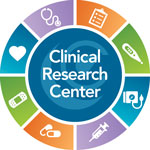By Rylee Salutregui
Clinical Research Center Intern
Imagine waking up with an excruciating headache. You stumble into the bathroom, open the medicine cabinet, look in, and find … nothing. It’s empty. You then wander around and decide that the store should have something to take for the pain. So, you drive to it and walk into the pharmacy, only to see bare shelves. Now what? Where’s all of the medicine? What are you going to do about that throbbing pain in your head?
That is what life would be like without clinical research.
We all know someone who takes medication for a disease. But without clinical research there would be no medications, just untested supplements that may or may not actually help treat and prevent disease.
Every medicine that is out on the market was once in a clinical trial. But before that medicine could get to the pharmacy or your medicine cabinet, people like you and I volunteered to participate in a clinical study so it could get there.
Each person is unique and different; therefore, not one medicine will work as effectively on every person with that disease. This is why it is important for everyone to educate themselves and consider participating in a clinical research study.
Where it all began
Let me take you back, to the open seas of the mid-18th century, where many believe clinical research all started. Scurvy, the disease caused by severe vitamin C deficiency, was killing more British sailors during this time than the Spanish and French navies. In May 1747, Dr. James Lind, the surgeon aboard the HMS Salisbury, decided to run a 12-person clinical trial on scurvy.
The trial consisted of him giving pairs of men different combinations of treatments for six days. Over the years, Dr. Lind has been credited as being the first to use this method of a control group, which is still practiced today. We don’t know too much about his exact findings, but we do know he inspired researchers around the world.
To honor this accomplishment we celebrate every May 20 as International Clinical Trials Day. This day recognizes how far clinical research has come and where it will continue to go. Thanks to Dr. James Lind, clinical research professionals and volunteers we no longer have to live a life without medicine.
About 80,000 clinical trials are in progress at any one time. These and future trials seek partners to help get new drugs and treatments approved by the FDA and to the public. If you are interest in being a part of this, see information below:
For local trials of The Corvallis Clinic – Clinical Research Center:
Contact us at 541-766-2163 or send an email to research@corvallisclinic.com. Or, follow us on Facebook at https://www.facebook.com/corvallisclinicresearch.
For national trials:
Visit www.clinicaltrials.gov and www.centerwatch.com for more opportunities
And Before you pop your next pill, stop and think about how it got to you. This video about MT Pharmacy is a representation of life without clinical research.
– Rylee Salutregui, Clinical Research Center Intern, will be graduating from Oregon State University’s College of Public Health and Human Sciences in June 2018 with a Bachelor of Science in Public Health-Health Promotion and Health Behavior with a Business minor
